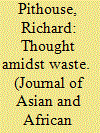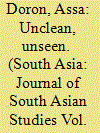| Srl | Item |
| 1 |
ID:
192620


|
|
|
|
|
| Summary/Abstract |
Rapid urbanization in 21st-century China has been fraught with contested demolition, overdevelopment and shoddy infrastructure with short lifespans. By viewing this infrastructure as having “high metabolism” and examining the urban scrap trade that is fuelled by its material outputs, this article challenges a common assumption that such a form of urbanization is merely wasteful and problematic. Crucially, such urbanization also puts rural migrants and scrap into motion in a way that helps to reproduce its form. This occurs by generating socio-material nodes of scrap trading wherein migrants make the most of temporarily stable situations with entrepreneurialism. The nodes are spaces of “suspension” shaped by challenges including cheap rental housing that is often targeted for demolition and frequent harassment from the authorities. However, the challenges do not prevent scrap traders from caring for kin, attending to human sentiments and sometimes achieving social mobility.
|
|
|
|
|
|
|
|
|
|
|
|
|
|
|
|
| 2 |
ID:
128958


|
|
|
| 3 |
ID:
169026


|
|
|
|
|
| Summary/Abstract |
This article juxtaposes two conflicting images of China’s environment during the socialist Mao era. One is an influential scholarly account of environmental destruction due to Mao’s insistence that “man must conquer nature” (ren ding sheng tian). The other, provided by a longtime resident of Kunming, is an idyllic description of an urban material reuse system without waste. The different images involve variances in the very notions of nature and environment on which they are grounded. The former posits the Chinese tian as equivalent to a western environmentalist notion of nature, while the latter corresponds with a Marxist materialist notion that waste is part of nature’s bounty. I explore the politics of fixing translational equivalents in the interplay between history, memory, and power by focusing on excesses of each image: Mao’s tian as an impediment to cultivating collective agency, and forms of industrial pollution that were not signified by “garbage.” Kunming city government documents further highlight crucial rifts in material flows that unfolded through the Mao era, complicating both images. Ultimately, by probing shifting Chinese “natures,” I clear conceptual space for capturing the important roles played by waste matter and practices of frugality in shaping recent Chinese history.
|
|
|
|
|
|
|
|
|
|
|
|
|
|
|
|
| 4 |
ID:
117768


|
|
|
|
|
| Publication |
2012.
|
| Summary/Abstract |
This paper begins by noting that some forms of leftism reinforce rather than oppose the exclusion of the urban poor from the agora. It shows that neither the capacity for intellectual nor for ethical seriousness can be read off a sociological location and suggests that a humanism made, in Cesaire's terms, 'to the measure of the world', a commitment to a universal ethic, is necessary if the humanity, and therefore the prospect of political agency, on the part of all people is to be recognized. It concludes by arguing that recent debates about a return to a communist Idea need to be mindful of a history in which communism has been a form of imperialism rather than a genuinely universal ideal.
|
|
|
|
|
|
|
|
|
|
|
|
|
|
|
|
| 5 |
ID:
149778


|
|
|
|
|
| Summary/Abstract |
Successive Indian governments have attempted to tackle the formidable task of creating a clean India, with varied results. With the country's rapidly growing middle class eager to participate in a sanitised global consumer capitalism, many Indians are becoming frustrated with the ‘unruly’ nature of their urban landscape, its dirty streets and public spaces. This is particularly discernible amongst India's middle-class youth, who seem impatient with the state's apparent inability to manage waste and disorder, and it is clear that several civil society campaigns designed to promote a clean India explicitly target Indian youth. In this paper, I explore what the ideological premise of cleansing initiatives reveals about the aspirations, needs and anxieties of India's youth.
|
|
|
|
|
|
|
|
|
|
|
|
|
|
|
|